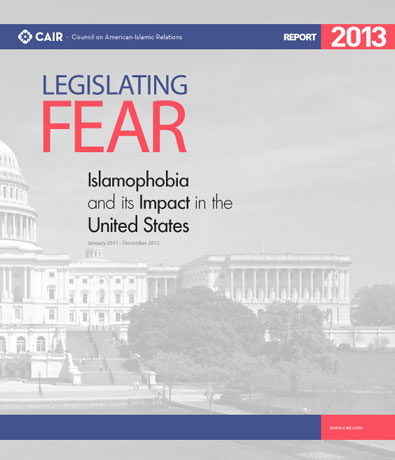CAIR's Groundbreaking Report on Islamophobia in America Shows Organized, Well Funded Effort to Spread Fear of Muslims
 In 2013, the Council on American Islamic Relations (CAIR) published a report on the state of Islamophobia in the United States. The CAIR authors cited the primary goal of the report as an effort to more consistently track perceptions and policies that negatively affect Muslims living in the United States.
In 2013, the Council on American Islamic Relations (CAIR) published a report on the state of Islamophobia in the United States. The CAIR authors cited the primary goal of the report as an effort to more consistently track perceptions and policies that negatively affect Muslims living in the United States. Compiled from research and interviews with Muslim and non-Muslim contributors in academia, civil rights organizations, and the government, the 162-page document provides a comprehensive snapshot of the inner and outer core funders of the Islamophobia network, their strategies, and the patterns of funding they receive.
The report, Legislating Fear: Islamophobia and its impact in the United States, found that while overall levels of Islamophobia have decreased slightly from 2010, discrimination against Muslims and negative feelings toward the Islamic faith remain relatively stable among a sizeable percentage of Americans
The report specifies a number of areas where anti-Muslim activities and activism have taken place over the last few years. From widespread circulation of propaganda films to mainstream media outlets to local, state, and federal government houses, Islamophobic activities were found to be realities in a variety of public forums.
In what may be the most revealing part of the report, CAIR provides a thorough financial account of the anti-Islam/anti-Muslim network operating primarily within the U.S. CAIR estimates that an “inner core” of 37 Islamophobia networks had access to nearly $120 million of total revenue from 2008-2011.
Legislating Fear also credits its findings to a number of reports published over the last four years that have tracked the paper trails of Islamophobic networks around the world. The Center for American Progress’ (CAP) 2011 publication, Fear, Inc, was the first report to comprehensively document the financial backing of groups and individuals promoting prejudice against Muslims. CAP cited seven primary foundations contributing $42.6 million over a ten-year period to organizations promoting anti-Islam sentiment within the United States.
In addition to the primary funding and operational sources of Islamophobia, Legislating Fear also documents 32 “outer core” groups, identified as “groups or individuals whose primary purpose does not appear to include promoting prejudice against or hatred of Islam and Muslims but whose work regularly demonstrates or supports Islamophobic themes.” The report suggests that the breadth of outer core activities, such as comments consistently made on the Fox News Network, have contributed to the social acceptability of anti-Muslim legislation and hearings. In 2011 and 2012 alone, 78 bills or amendments framed to vilify the religious practice of Muslims were introduced in 29 states and the U.S. Congress. Further, the report cites 11 states where mainstream Republicans introduced or supported blatant anti-Muslim legislation, and an Ohio State University study that found an increase of fear toward American-Muslims among political moderates and liberals following the killing of Osama bin Laden in 2011.
Although the CAIR report documents an extensive network of Islamophobic activities and negative sentiments toward Muslims within public and private spheres, the report also highlights specific events that have contributed to a slightly improved atmosphere for Muslims living in the United States. From Congressional hearings on the status of civil rights among American Muslims, to a bipartisan rejection of Rep Michelle Bachman’s (R-MN) characterization of Muslim extremists infiltrating the U.S. Government as public servants, the report claims that overall acknowledgement of Islamophobia has increased.
In addition to outlining the Islamophobia network, the CAIR report also proposes proactive strategies to mitigate the efficacy of anti-Muslim efforts. One recommendation suggests ostracizing Anti-Islam hate groups from mainstream public discourse in a manner similar to efforts that have successfully counter the Ku Klux Clan. Other ideas include removing anti-Muslim, discriminatory trainers and materials used by the U.S. military and law enforcement agencies, providing further safety measures for Mosques and attendees, and supporting the End Racial Profiling Act.
The report also draws attention to the word “Islamist,” and the unfair, and often times inaccurate, assertions that accompany the word’s usage within mainstream American media. The authors suggest that media outlets either drop or modify their usage of “Islamist,” arguing that the usage of “Judaist,” “Christianist,” or “Hinduist” would never be used due to the ambiguous and offensive nature of the terms.
Legislating Fear was released in late 2013, and CAIR is expected to continue publishing similar reports every two to three years.









Comments powered by CComment